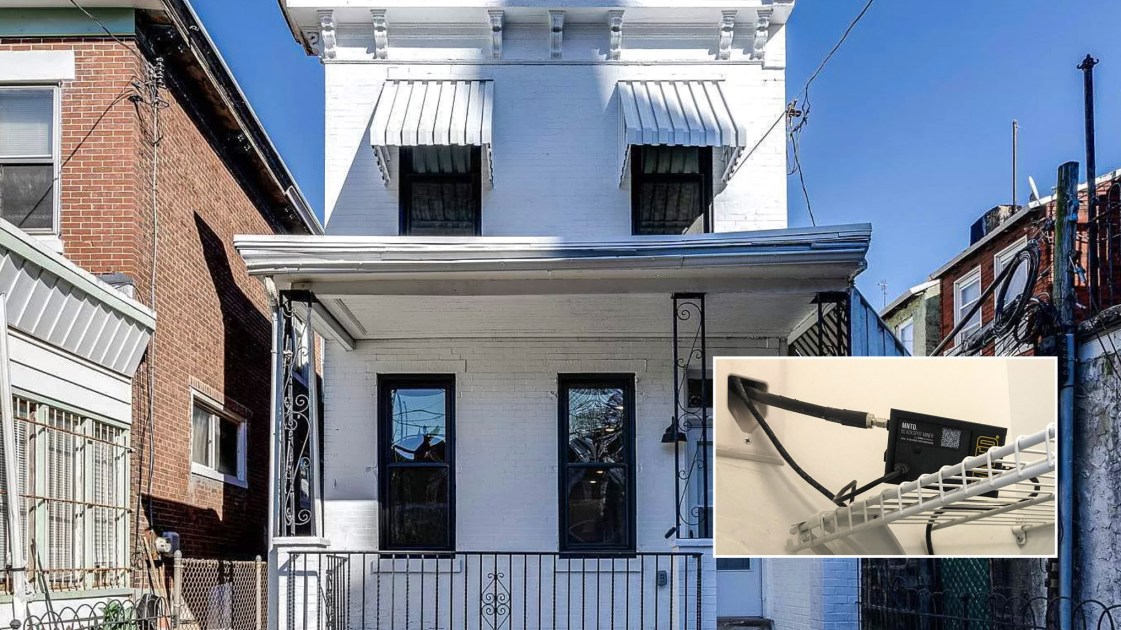
💌 Love Philly? Sign up for the free Billy Penn newsletter to get everything you need to know about Philadelphia, every day.
If the Disney Channel Original Movie “Smart House” came out today, the villainesque home would have Amazon Alexas embedded in the walls, use too much artificial intelligence, and somehow mine Bitcoin.
At one West Philly home, one of those futuristic home improvements is coming true.
A new listing at 835 N. 42nd St. in Belmont has three bedrooms, lots of natural light, outdoor space — and a built-in cryptocurrency miner designed to generate passive income for the homeowner.
How it works: the miner is an inconspicuous black box that runs on Helium, a new cryptocurrency connected to the internet of things, the network that connects smart fridges, smart toasters, and other high-tech appliances. In this instance, the device connects to an antenna and a wifi router, and borrows bits of your internet bandwidth to mine crypto.
The more the “Helium hotspot” is used, the more crypto you’ll earn. You can follow along with your progress on an app, and experts say the new coin might be more environmentally friendly than other crypto.
When Billy Penn toured the house last weekend, the hotspot was mining $2.75 worth of cryptocurrency a day, which means it could net about $80 a month at Helium’s current value. The hotspot only costs $1.50 a month in terms of electricity, which means it’s pretty easy to churn a profit — at least according to Mark Masih, the realtor on the listing.
You can get a more real world estimate using a Helium explorer app, which will tell you there are currently 7 Helium hotspots in the neighborhood. Most are inactive, but the two that are running earned $16 and $25 last month, respectively.
Asia Hightower is a 42-year-old first time home-buyer who lived in Belmont for nearly 30 years before moving slightly west. When she saw Masih’s listing, her first impression was “That’s a nice house.”
She liked the location, the finishes, and the brightness of the interior. But what really left an impression was the Helium hotspot.
“It shocked the hell out of me. Once I realized what Mark was doing, I thought it was so forward thinking,” Hightower told Billy Penn. “It would be like walking into a savings account.”
For Masih, it’s not about how much money the house generates, but what it represents: an opportunity for modern financial literacy.
In recent months, crypto has been called the “currency of the alt-right,” as white supremacists groups like the Daily Stormer turned to the decentralized tender to avoid financial oversight. And while 44% of cryptocurrency traders are people of color, there’s a growing fear that a lack of access might box them out of future earnings.
“There are a lot of demographics who might miss out on it,” Masih said, “and I want whoever buys this house and takes its value in to be someone who might not traditionally know about crypto.”
In Belmont, a majority Black neighborhood, the median household income is a little over $25,000. The average sale price right now for a home in the area is about $97,000.
Masih’s listing is going for $239,000. No one has made an offer yet, but that hasn’t stopped him from thinking about the ideal buyer — or how negotiations might go.
“The order of importance is someone from the neighborhood, then someone who represents the neighborhood,” said Masih. “And if someone who fits that profile came in a little under asking [price], I’d still prefer to sell to them.”

Maish has been a real estate professional on and off for 8 years, and he works with Compass Realty, selling homes in West Philly and the suburbs.
Hightower fits his profile of the ideal buyer: from the area, open-minded, and excited about crypto. After she received her first round of stimulus checks during the pandemic, she bought $200 worth of Bitcoin and Etherum because it was trendy. Since then, she’s diversified her portfolio a bit and earned back her initial investment.
Hightower says she sees the value in the home, but can imagine why older community members might not be interested.
An interactive map from the City Controller’s Office reveals at least three gun violence hotspots within the neighborhood. Many residents are concerned that housing redevelopment and gentrification aren’t the right solutions. Hightower herself moved out.
“For lots of long-time residents, better means flight. It means getting out of the neighborhood,” said Hightower. “After a while you get jaded and tired of the things that come along with living in this community.”

On the environmental side, traditional Bitcoin mining is energy intensive. Large mining setups burn more electricity than some countries, while each individual transaction uses enough electricity to power the average American household for 6 weeks.
Helium hotspots just like the one in this West Philly house might end up being a sustainable alternative for those looking to get into decentralized finance, says PennFutures Director Rob Altenburg, who has examined the impact of crypto mining on Pennsylvania’s environment.
“What we don’t like about Bitcoin is the wastefulness baked into it,” Altenburg told Billy Penn. “Helium could be a good alternative, since it doesn’t have this wasteful proof of work system.”
Because Helium more or less runs on ethernet, its energy consumption is much lower in comparison to Bitcoin.
Masih, the realtor, is cautious about whether or not the Helium hotspot will help sell the house, let alone solve any major environmental or economic problems.
“I don’t want someone to buy the house for the miner,” Maish said. “Helium is a token. It can fall apart next week.”
This news is republished from another source. You can check the original article here

Be the first to comment